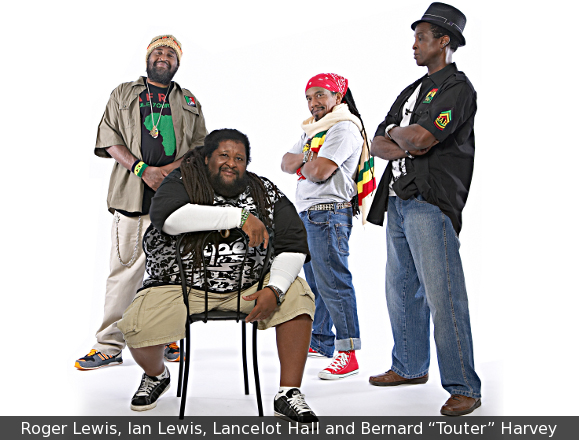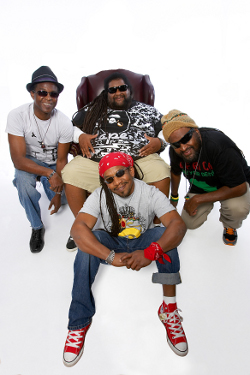Articles about reggae music, reviews, interviews, reports and more...
Interview: Inner Circle
- Home
- Articles
- Interviews
- Interview: Inner Circle

Interview: Inner Circle
"Reggae is like a Picasso - you can't duplicate it"
Sampler

Inner Circle’s Ian Lewis on the course of reggae music
Reggae band Inner Circle is today probably best known for early 90’s smash hit singles Bad Boys and Sweat (A La La La La Long). But Inner Circle had their fair share of success in the 70’s and their lead vocalist Jacob Miller is said to have been bigger than Bob Marley in Jamaica. United Reggae’s Erik Magni got a lecture in reggae history when he spoke to one of the group’s founders – Ian Lewis.
Ever seen U.S. reality TV show Cops? If you have you’re probably familiar with its theme Bad Boys, a tune written and performed by Jamaican reggae band Inner Circle in the early 90’s.
The core of Inner Circle is bass and guitar playing brothers Ian and Roger Lewis, and an early line-up of the band also comprised three future members of Third World. But the most recognized star in the group was late lead singer Jacob Miller. And with him in the group things started to happen in the mid 70’s.
According to Ian Lewis he and his brother met Jacob Miller at a bus stop singing. And the rest is as you say history. Together they brought forward both heavy as lead Rasta praises as well as disco-fused reggae albums, such as Everything is Great, which included We a Rockers, the lead motif to the cult reggae motion picture 'Rockers'.
Wants to clarify certain things
I reach Ian on the phone from Miami where he has lived since the 80’s. He and the band are doing interviews to promote a tribute concert to Jacob Miller in Miami, USA, on February 24th. One of the first things that Ian makes clear is that facts tend to be missed out in the history of reggae music and that he wants to clarify certain things. He also seems to be upset that reggae is usually referred to as “weed music” and not for what the genre has accomplished.
“Reggae was born out of boogie woogie and most musicians were jazz musicians. But the political nature changed when Jamaica got independent. It was created out of political change” believes Ian, and continues:
“Reggae was born from the sufferation and consciousness of the people and out of dreams of independence.”
Cheerful memories
It’s obvious that Ian has strong and cheerful memories of the early days of reggae.
“It was a joy to go to a reggae show. The vibe was strong and intense,” he says, but adds:
“Now it’s like anything goes. It’s not a matter of genre. It reflects what the youths feel.”
We will come back to Ian’s thoughts of the reggae scene today. So let’s go back to the early 70’s when Ian, his brother Roger and many, many other singers, deejays, musicians and producers strived to make a living out of their music.
“A typical session had about five to six singers waiting outside the studio and it was a groove back then. We could record 15 to 20 songs in one day and got like three dollars to play one song or like six dollars for ten to 20 songs. Today it’s one song in one day. You lose a little mystique,” explains Ian, and continues:
“Back in the day the singer would sing and then we played the riddim. Today it’s riddim first and then it’s the songs,” he further explains, and makes an example:
“Cherry Oh Baby, Eric Donaldson stepped in the studio and sang what he was feeling. And we played what he felt. Now it’s computerized, more planned,” he says, and adds:
“You had the Waterhouse sound with Junior Reid, the Trenchtown sound, the uptown sound, the downtown sound. People like Freddie McKay or Studio One and Channel One. It’s gone. It won’t happen again.”
“Bob was mystical”
 During our chat Ian comes back to one particular tune a couple of times – The Wailers’ Stir it Up.
During our chat Ian comes back to one particular tune a couple of times – The Wailers’ Stir it Up.
“We played on that, but were never credited,” claims Ian, and continues:
“But we don’t worry about that. It took about four hours to record. We played it over and over. Just grooving.”
Ian also has a clear memory of Bob Marley.
“He had a Ford Escort, a big smile and this afro. He was just a little kid coming in. It was always something with him,” remembers Ian, sings a couple of notes from Small Axe and continues:
“Bob was mystical. I can’t explain it. You can’t find another Bob or Jacob Miller again. They were born to sing. And you can never find another Carlton Barrett. He was unbelievable. Humble, always a laugh and a joke,” he says.
Reggae needs respect
The late drummer Carlton Barrett was together with his bass playing brother Aston “Familyman” Barrett an important part of the Wailers and later Bob Marley & The Wailers. And they were also a crucial part of the reggae history and the sound of the genre. According to Ian the Barrett brothers haven’t received their fair share of credit.
“Police stole the sound from the Barrett brothers. Let the world know the truth. Reggae music was influencing English punk. People need to know what reggae music has done. Never got the respect and due for what it has done for 50 years,” he states.
Lacks bass line
This is when our conversation turns to contemporary reggae and dancehall. And Ian is disappointed of what reggae, and especially dancehall, has evolved into.
“You talk about dancehall; it’s what’s played in the dancehall. Dancehall is a place and it used to be a lawn, and not a club. It was music that surrounded the dancehall,” he says, and continues:
“Today people promote the artist, and not the vibe. We used to export reggae, now we import it” he believes, and asks a question:
“How can you play reggae music without a bass line? It’s not reggae music,” he says, sings some notes from Satta Massa Gana, and adds:
“I don’t want to judge, but I can’t feel it.”
Why Ian Lewis loves reggae
Even though Ian seems frustrated over a certain musical direction he is proud over what Inner Circle in general and reggae in particular have accomplished over the past 50 years.
“Today reggae is a worldwide music and reggae music unites the world. Reggae will always survive and reggae is a way of life. It is original. It’s like a Picasso – you can’t duplicate it. People feels something in the music,” he states, and asks me a question:
“Have you seen the baby listening to Bob Marley’s Buffalo Soldier on Youtube?”
“That’s why I love reggae.”
Read comments (1)
| Posted by Cuzy Bro on 02.23.2012 | |
| Ian Lewis baaad asss bass player. A true reggae legend. Bring the roots bak!!! | |
Comments actually desactivated due to too much spams
Browse by categories
Recommended Articles
Latest articles
Recently addedView all
© 2007-2025 United Reggae. All Rights Reserved. Reproduction in whole or in part is prohibited. Read about copyright
Terms of use | About us | Contact us | Authors | Newsletter | A-Z














